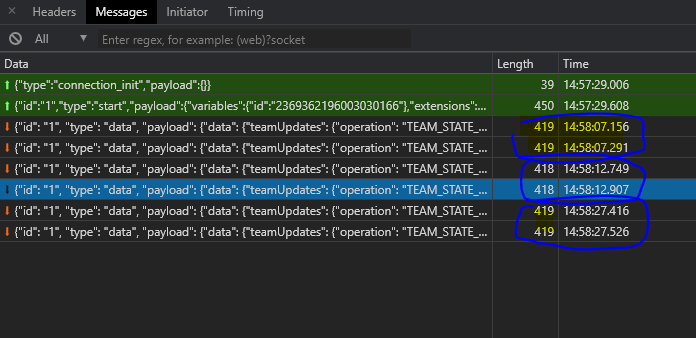A plug-and-play GraphQL subscription implementation for Graphene + Django built using Django Channels. Provides support for model creation, mutation and deletion subscriptions out of the box.
-
Install
graphene-subscriptions$ pip install graphene-subscriptions
-
Add
graphene_subscriptionstoINSTALLED_APPS:# your_project/settings.py INSTALLED_APPS = [ # ... 'graphene_subscriptions' ]
-
Add Django Channels to your project (see: Django Channels installation docs) and set up Channel Layers. If you don't want to set up a Redis instance in your dev environment yet, you can use the in-memory Channel Layer:
# your_project/settings.py CHANNEL_LAYERS = { "default": { "BACKEND": "channels.layers.InMemoryChannelLayer" } }
-
Add
GraphqlSubscriptionConsumerto yourrouting.pyfile.# your_project/routing.py from channels.routing import ProtocolTypeRouter, URLRouter from django.urls import path from graphene_subscriptions.consumers import GraphqlSubscriptionConsumer application = ProtocolTypeRouter({ "websocket": URLRouter([ path('graphql/', GraphqlSubscriptionConsumer) ]), })
-
Connect signals for any models you want to create subscriptions for
# your_app/signals.py from django.db.models.signals import post_save, post_delete from graphene_subscriptions.signals import post_save_subscription, post_delete_subscription from your_app.models import YourModel post_save.connect(post_save_subscription, sender=YourModel, dispatch_uid="your_model_post_save") post_delete.connect(post_delete_subscription, sender=YourModel, dispatch_uid="your_model_post_delete") # your_app/apps.py from django.apps import AppConfig class YourAppConfig(AppConfig): name = 'your_app' def ready(self): import your_app.signals
-
Define your subscriptions and connect them to your project schema
#your_project/schema.py import graphene from your_app.graphql.subscriptions import YourSubscription class Query(graphene.ObjectType): base = graphene.String() class Subscription(YourSubscription): pass schema = graphene.Schema( query=Query, subscription=Subscription )
Subscriptions in Graphene are defined as normal ObjectType's. Each subscription field resolver must return an observable which emits values matching the field's type.
A simple hello world subscription (which returns the value "hello world!" every 3 seconds) could be defined as follows:
import graphene
from rx import Observable
class Subscription(graphene.ObjectType):
hello = graphene.String()
def resolve_hello(root, info):
return Observable.interval(3000) \
.map(lambda i: "hello world!")Each subscription that you define will receive a an Observable of SubscriptionEvent's as the root parameter, which will emit a new SubscriptionEvent each time one of the connected signals are fired.
A SubscriptionEvent has two attributes: the operation that triggered the event, usually CREATED, UPDATED or DELETED) and the instance that triggered the signal.
Since root is an Observable, you can apply any rxpy operations before returning it.
For example, let's create a subscription called yourModelCreated that will be fired whenever an instance of YourModel is created. Since root receives a new event every time a connected signal is fired, we'll need to filter for only the events we want. In this case, we want all events where operation is created and the event instance is an instance of our model.
import graphene
from graphene_django.types import DjangoObjectType
from graphene_subscriptions.events import CREATED
from your_app.models import YourModel
class YourModelType(DjangoObjectType)
class Meta:
model = YourModel
class Subscription(graphene.ObjectType):
your_model_created = graphene.Field(YourModelType)
def resolve_your_model_created(root, info):
return root.filter(
lambda event:
event.operation == CREATED and
isinstance(event.instance, YourModel)
).map(lambda event: event.instance)You can also filter events based on a subscription's arguments. For example, here's a subscription that fires whenever a model is updated:
import graphene
from graphene_django.types import DjangoObjectType
from graphene_subscriptions.events import UPDATED
from your_app.models import YourModel
class YourModelType(DjangoObjectType)
class Meta:
model = YourModel
class Subscription(graphene.ObjectType):
your_model_updated = graphene.Field(YourModelType, id=graphene.ID())
def resolve_your_model_updated(root, info, id):
return root.filter(
lambda event:
event.operation == UPDATED and
isinstance(event.instance, YourModel) and
event.instance.pk == int(id)
).map(lambda event: event.instance)Defining a subscription that is fired whenever a given model instance is deleted can be accomplished like so
import graphene
from graphene_django.types import DjangoObjectType
from graphene_subscriptions.events import DELETED
from your_app.models import YourModel
class YourModelType(DjangoObjectType)
class Meta:
model = YourModel
class Subscription(graphene.ObjectType):
your_model_deleted = graphene.Field(YourModelType, id=graphene.ID())
def resolve_your_model_deleted(root, info, id):
return root.filter(
lambda event:
event.operation == DELETED and
isinstance(event.instance, YourModel) and
event.instance.pk == int(id)
).map(lambda event: event.instance)Sometimes you need to create subscriptions which responds to events other than Django signals. In this case, you can use the SubscriptionEvent class directly. (Note: in order to maintain compatibility with Django channels, all instance values must be json serializable)
For example, a custom event subscription might look like this:
import graphene
CUSTOM_EVENT = 'custom_event'
class CustomEventSubscription(graphene.ObjectType):
custom_subscription = graphene.Field(CustomType)
def resolve_custom_subscription(root, info):
return root.filter(
lambda event:
event.operation == CUSTOM_EVENT
).map(lambda event: event.instance)
# elsewhere in your app:
from graphene_subscriptions.events import SubscriptionEvent
event = SubscriptionEvent(
operation=CUSTOM_EVENT,
instance=<any json-serializable value>
)
event.send()This implementation was spun out of an internal implementation I developed which we've been using in production for the past 6 months at Jetpack. We've had relatively few issues with it, and I am confident that it can be reliably used in production environments.
However, being a startup, our definition of production-readiness may be slightly different from your own. Also keep in mind that the scale at which we operate hasn't been taxing enough to illuminate where the scaling bottlenecks in this implementation may hide.
If you end up running this in production, please reach out and let me know!
PRs and other contributions are very welcome! To set up graphene_subscriptions in a development envrionment, do the following:
-
Clone the repo
$ git clone [email protected]:jaydenwindle/graphene-subscriptions.git
-
Install poetry
$ curl -sSL https://raw.githubusercontent.com/sdispater/poetry/master/get-poetry.py | python -
Install dependencies
$ poetry install
-
Run the test suite
$ poetry run pytest






